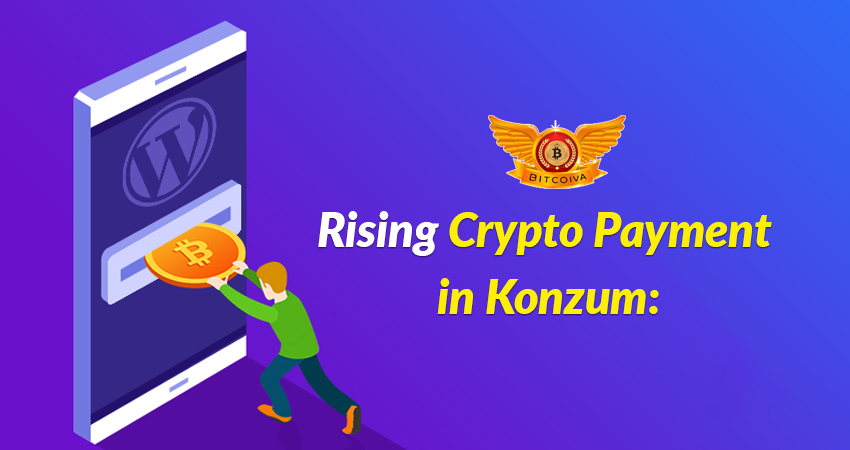Konzum Largest Grocery Chain Accepting Crypto Payment
Despite the ongoing bear market, Konzum, Croatia’s largest grocery chain, has seen an Increasing Crypto Payments like Bitcoin (BTC) this year.
According to Ines Barbir, the company’s head of business applications. Konzum has witnessed a rise in purchases made using cryptocurrency payments since launching them in 2021.
In December 2021, Konzum formally began accepting cryptocurrencies as payment for its goods. Customers may now make online purchases using nine cryptocurrencies, including BTC, ETH, Tether (USDT), and USD Coin (USDC).
Since then, the grocery chain has added numerous self-checkout cash terminals. In actual pilot shops to the list of payment options that accept cryptocurrency. In an effort to expand cryptocurrency payments to all 700 physical establishments in Croatia. Konzum is still collaborating with the regional cryptocurrency payment provider Electrocoin.
Rising Crypto Payment in Konzum
Barbir claims that the rollout of the new payment system went smoothly. And Konzum has been trying to increase the number of crypto payment options available. The CEO did not provide specific figures for the surge in payment volume since the introduction of crypto payments.
A company representative noted that increasing crypto payments on Konzum are in accordance with.
The Country of Croatia’s Growing use of the Technology, Saying
“Despite the weak market, we are happy with the steadily rising interest. Both the interest in cryptocurrency payments generally and the interest in their implementation in Croatia are continuously rising.
According to the spokesman, Croatia is “at the top in the European Union” in terms of the acceptance of cryptocurrencies. Also According to the spokesman, this is “partly due to the growth of fintech companies like our colleagues at Electro coin.”
According to the spokeswoman, there is some ambiguity around crypto payments. “The reason for this is mostly due to the insecurity and scepticism in new technologies, but also owing to the status of regulation of the crypto industry,” she said.
While local bitcoin proponents have been working toward self-regulation, the Croatian government has been rather quiet in recent years about cryptocurrency regulation. In 2018, the National Bank of Croatia made it clear that cryptocurrencies were neither accepted as payment methods nor foreign money in the nation.
Croatia has become one of the nations with the best crypto infrastructure in the world, despite some apparent uncertainties surrounding the technology. Croatia, along with nations like the United Arab Emirates, Georgia, and Romania, has a crypto-readiness score of 6.2 out of 10, according to a survey by the forex education portal Forex Suggest.

What is Crypto Payment
In the same manner as payment processors, gateways, and acquiring bank credit cards are used, cryptocurrency payment gateways are payment processors for virtual currencies. With the aid of cryptocurrency gateways, you may take digital payments and get paid right away in fiat money.
These businesses take away any doubts or concerns you might have about cryptocurrencies and let you provide more payment choices. This paves path to Increasing Crypto Payments.
It’s vital to remember that payment gateways for digital currencies are not necessary. Although it’s absolutely acceptable to accept bitcoin payments using your personal wallet, gateways relieve you of the additional burden of operating a wallet and cryptocurrency exchange.
Crypto service providers have devised more user-friendly crypto payment ways to help make the procedure foolproof. These gateways reduce a time-consuming process to one that may be completed in a matter of seconds. Depending on the payment processor, the specific stages vary, but the standard approach is as follows:
Crypto Payment Stages
1. A client chooses to pay for a good or service, or a friend wishes to be paid.
2. Using their payment gateway, the recipient creates a digital invoice that must be paid. This is typically a QR code with the required amount and the wallet address of the recipient. For instance, given the present market rate, it would take $10 of a certain cryptocurrency to buy a $10 (US dollar) dinner.
3. The payer verifies the payment by scanning the QR code with the app.
4. The cryptocurrency is transferred to the payee’s digital wallet or account.
It only takes a few clicks to finish the entire process. Compared to attempting to do every step manually, it is also more convenient and safe.
Cryptocurrency Payment Cards
Using a credit or debit card with a cryptocurrency-linked payment option is another. So, even if the recipient only accepts fiat currency, you can still send them money using cryptocurrencies. You must keep coins and tokens on deposit with your card issuer in order to utilise a crypto card.
The cryptocurrency exchange sells your digital assets when you make a purchase and transfers the proceeds to the payee in the form of required fiat. You might potentially use cryptocurrency in some circumstances to settle your monthly credit card bill. Depending on the issuer or financial institution, the specifics will vary.
More locations accept crypto cards than crypto payment gateways. It’s more difficult to pay a buddy directly if they don’t accept credit cards, though. Card payments are also inappropriate if the payee requests crypto payments. Various financial service providers presently provide crypto card choices through Visa and Mastercard.
Customers are utilizing cryptocurrency to pay for a wide range of items, from Starbucks to Lamborghinis, and merchants are taking notice.
According to a June Deloitte report titled “Merchants getting ready for crypto,” around 75% of stores intend to accept cryptocurrency or stablecoin payments within the next two years.
Cryptocurrency Payment Cards Increasing Crypto Payments
A sample of 2,000 top retail executives, including those from the cosmetics, electronics, fashion, transportation, food, and beverage industries, was surveyed by Deloitte.
A stablecoin is a sort of cryptocurrency that derives its value from an underlying asset, in contrast to how digital currencies like Bitcoin often only have value to the extent that users believe they do. Stablecoins are frequently anchored to commodities like gold or currencies like the US dollar.
Despite the fact that purchasing cryptocurrencies is still relatively new, 83 percent of merchants anticipate that consumer interest in them will grow over the coming year, and just over half of them have made investments of over $1 million to support digital payments, according to the report.
Customers should expect to eventually be able to purchase items like clothing, beverages, cosmetics, and more using cryptocurrency.
Visit us : www.bitcoiva.com

